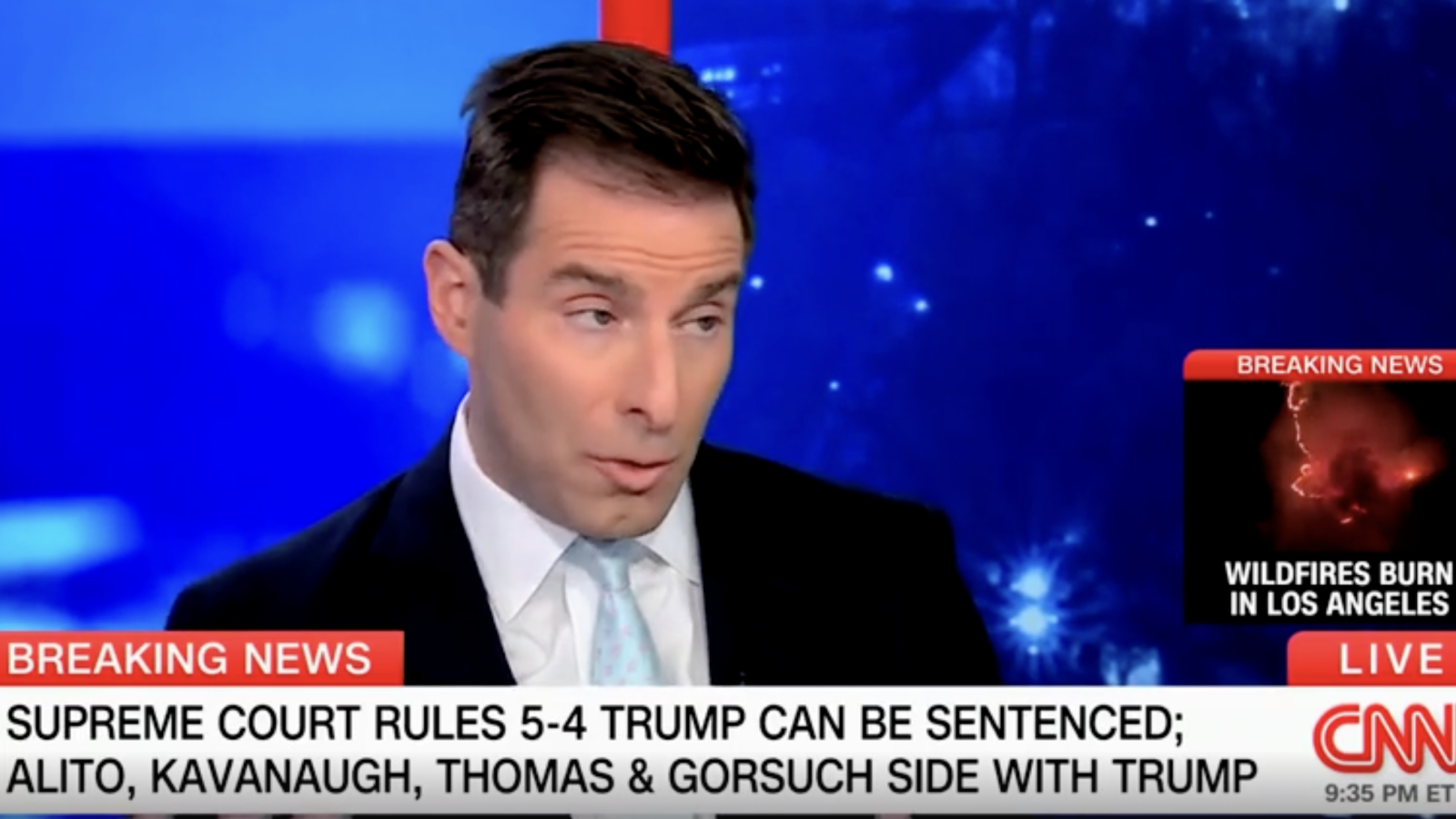President Trump has officially now been sentenced in the so-called “Hush money case” after the Supreme Court voted 5-4 in a decision to not intervene.
BREAKING: Supreme Court Rules Against President Trump, Amy Coney Barrett Sides With Liberal Judges
As a result, the sentencing has gone forward this morning.
But is it all bad news?
I'm going to do something I don't often do, but we're going to go to CNN and legal expert Elie Honig who makes a valid argument that President Trump actually picks up a nice benefit by now having this step completed.
Elie Honig explains why Trump ‘actually gets a benefit’ by being sentenced https://t.co/hGvJhOy8wa
— 🍊🇺🇸CheshireCat(Judith)🇺🇸🍊 (@Chesspuss7) January 10, 2025
You can watch the clip here:
Backup clip here in full video player with transcripts if that's better for you:
BREAKING: CNN legal expert explains why President Trump actually gets a nice benefit from today's sentencing. pic.twitter.com/EGliO9gqCm
— Noah Christopher (@DailyNoahNews) January 10, 2025
FULL TRANSCRIPT:
Kaitlan Collins:
Speaking to reporters right after the Supreme Court order came down. I'm going to turn to CNN's Elie Honig, who is joining me here.
Elie, you see Donald Trump. He is at Mar-a-Lago there. That means he is going to be appealing virtually—or appearing virtually—tomorrow. We'll get to that in a moment.
But on this decision, everyone was waiting to see what it said. Even people in Trump world that I've been talking to were kind of divided on whether or not the Supreme Court was going to take their side. Were you surprised by this?
Elie Honig:
I was surprised it was this close, Kaitlan. We were one vote away from the U.S. Supreme Court preventing Donald Trump from getting sentenced by Zoom to essentially nothing.
I mean, that would have damaged the Supreme Court's credibility beyond all recognition. And I think the opinion that came down 5 to 4, letting the sentencing go, was perfectly sound.
Basically, the justices in the majority said two things. First of all, they said, "What's the harm? You're going to get sentenced to nothing. You can do it by Zoom. You can roll out of bed and do it."
And second of all, they acknowledged that Trump may have substantial issues on appeal. I think he has substantial issues on appeal. But you can handle them through the full appeal process that follows sentencing. They're saying, "You don't need to do this right now. There are normal channels to handle this."
But Trump just doesn't want it to happen before he becomes president.
And you know what's maybe ironic about it? Trump actually gets a benefit by being sentenced tomorrow, which is once that sentencing is over—as of tomorrow morning—then he can take his full appeals.
He can go up the New York courts of appeals. He can go maybe to the U.S. Supreme Court and say, "The charge against me was unconstitutional," which I think it may be.
He can argue that the jury was not properly instructed. But if he had gotten his way—if he was not sentenced tomorrow—he would not have been able to appeal. That would have been it. So this sentence would have sort of died in a netherworld.
And part of their argument had been that it was going to be too tough for him to get sentenced tomorrow, that he couldn't show up to the sentencing in New York.
The justices made a point—the five who ruled that this could happen—and said that it was relatively insubstantial in light of what the court is saying they're going to do, which is to impose that sentence of unconditional discharge.
And it's a brief virtual hearing. He doesn't have to be there in person tomorrow.
So this was a smart move by Judge Mershon because he said last week, "I'm going to sentence you to essentially nothing, and you can do it by Zoom."
If Mershon had not done that, if he had just said, "Appear for sentencing Friday; it'll be like any other sentencing—you don't know what you're going to get until I tell you," that might have changed the Supreme Court's calculus.
Because Trump's argument was, "I could be subject to what we call irreparable harm."
And if Trump was able to say, "I don't know, maybe this guy's going to try to lock me up. Maybe he's going to impose some serious penalty. Maybe I don't have the time as president-elect to travel to New York and sit in a courtroom and go through security."
Instead, Mershon absolutely minimized that.
OK, so he appears virtually via—I'll call it Zoom; I don't even know what it is for the court system.
When you get sentenced, you have an option to say something, right?
You just hit on what the biggest point is going to be to watch for tomorrow. Any defendant at sentencing absolutely has a right to speak. Almost always, they do.
So Trump might say, "I have nothing to say, Your Honor," or he might give us a rant. I mean, I would bet on that because, look, he's got nothing to lose.
He knows he's getting sentenced to nothing. So watch that part.
Even if he speaks before the sentencing and goes off on the judge, which he does and did tonight, that won't change how Mershon sentences him.
Mershon left himself a tiny bit of wiggle room, right? He didn't say, "I promise I will sentence you." He said, "I intend to sentence you."
But I think it would take an awful lot to push Mershon from sentencing to unconditional discharge to lashing out with a sentence.
Gorsuch, Kavanaugh, Roberts, Alito—they were willing to stop this.
What's the make of that argument? Their argument would be, as a purely procedural matter, Trump was still in the process of appealing based on immunity.
We got the immunity ruling six months ago. And if you look at it a certain way procedurally, while you're appealing on immunity as a defendant, you're entitled to a complete stay—meaning no trial, no sentencing, no nothing.
But the majority—and again, Amy Coney Barrett and John Roberts joined with the liberals—said, "If there's no harm, there's no harm."
And that's really what carried the day here.
So this news—and then right after that, it came down—the effort to keep the special counsel's report away from public view. Also, Trump lost on that.
They can still appeal it. We'll see what happens. And we're going to see—I’ll spoil that one—we're going to see those reports eventually.
Kaitlan Collins:
OK, well, we might see you back here tomorrow. So thank you for that.
Up next, of course, we are continuing to keep a close eye on what is happening on the ground in...




Join the conversation!
Please share your thoughts about this article below. We value your opinions, and would love to see you add to the discussion!